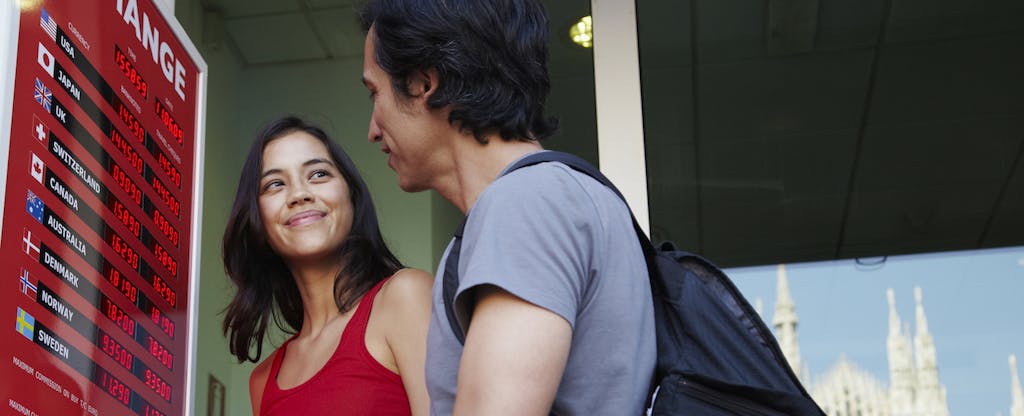In a Nutshell
When traveling in another country, you have to use local currency — but the airport currency exchange probably isn’t the best option for exchanging your dollars.So you’ve renewed your passport, booked airfare and secured your hotel. The next item on your list? Getting local currency so you can experience the local life.
But chances are you won’t get the best deal on your currency exchange by using the airport cash desk. It may be convenient, but it could also mean extra fees and subpar exchange rates compared to other options.
We’ll break down your choices and arm you with info that can help you get the most for your dollar when exchanging currency on your next trip, so you can enjoy life abroad that much more!
What kinds of fees do currency exchanges charge?
Currency exchanges both at home and abroad may charge you more than the real exchange rate. For example, Travelex — one of the world’s most popular exchanges — listed the exchange rate for the Euro at $0.7799 at the time of writing this article. The real exchange rate was about $0.8554 per $1 converted, according to XE Exchange.
This may sound like a small difference on paper, but the more money you convert, the more it can add up. For example, if you exchanged $1,000 at Travelex for the rate above, you’d pay a 75.50 euro fee because of the exchange rate.
FAST FACTS
How to know if you're getting a good exchange rate
To start, use a reputable exchange rate app or website like XE Exchange. This service uses information from more than 100 sources to find the most accurate exchange rate data. You can use its exchange rate when comparing rates to your currency exchange.
The best alternatives to the airport currency exchange
Just because the airport currency exchange doesn’t give you the best deal doesn’t mean you’re stuck paying unnecessary fees to get local currency. Here are three ways you can get a better exchange rate when making purchases abroad.
Use your credit or debit card when possible
One of the best ways to get a good exchange rate abroad is by using your credit card to make purchases — as long as the card doesn’t charge foreign transaction fees.
Check your cardholder agreement — if your current card charges a foreign transaction fee, consider applying for a card from our list of cards with no foreign transaction fees.
Fees aside, using your credit or debit card is probably your safest bet for getting an exchange rate that’s closest to the market rate. But be aware that while your card’s issuer bases its exchange rate on market conditions, it does set its own exchange rate for transactions. This can be updated daily based on market rates.
Before your trip, ask your card issuer what rate it’s using, then compare it with the market rate using a currency-comparison website, like x-rates.com. And while you’re away, remember that Visa and Mastercard both have foreign exchange calculators posted online, so you can see what your total purchase price will be before swiping.
Use a local ATM (with caution)
Another way to get currency abroad is by using your U.S. debit card at a local ATM.
But be cautious when doing so — some debit cards charge out-of-network transaction fees. Call your bank before your trip to see if your card charges these fees. If so, look for a debit card that doesn’t.
If you’re not sure if your U.S. debit card will work abroad, call and ask. It’s also a good idea to let your bank know where and when you’ll be traveling in advance, to avoid a possible freeze on your card for suspected fraud. If you’re already away, look at the processor logos posted on the front or side of the ATM to see if it supports your card’s payment network (Visa, Mastercard, etc.).
Also, some ATMs charge a nonbank usage fee or provide unfavorable exchange rates. We recommend using ATMs from local or international banks, versus tourist-focused ATM companies like Euronet, for a more likely shot at the best exchange rates.
Why is this? Some tourist-focused ATMs use dynamic foreign exchange rates. This means that the ATM will show you your withdrawal in both the local currency and your home currency, allowing you to pick which currency you’d like to process your withdrawal in. Processing the withdrawal in U.S. dollars could give you a less-than-favorable exchange rate.
If you do have to use a tourist-focused ATM, we recommend choosing the local currency for your transaction.
Order currency ahead of time
One of the best and most cost-effective ways to get local currency for your destination is by ordering it ahead of time from your bank. Bank of America, PNC and other U.S. banks will exchange currency for you in-branch. We recommend pulling up XE Exchange or another online currency converter to compare their rate to the market rate.
But beware of bank fees. Bank of America, for example, charges a $7.50 delivery fee for currency orders of less than $1,000. This fee is waived for customers ordering $1,000 or more.
You should also be sure to call your bank ahead of time when ordering currency. They may not have your currency of choice on hand or could charge a fee for expedited delivery. In the case of Bank of America, this fee is $20.
Bottom line
It pays to be prepared when traveling abroad. The airport currency exchange or those near tourist city centers may advertise no fees, but often have a less-than-stellar exchange rate.
Our advice? Use a credit card with no foreign transaction fee when possible. Or get your cash as local currency from a local ATM when abroad or from your bank before your trip. If you do decide to use a currency exchange, do your research and assess the exchange rate and other fees beforehand.


